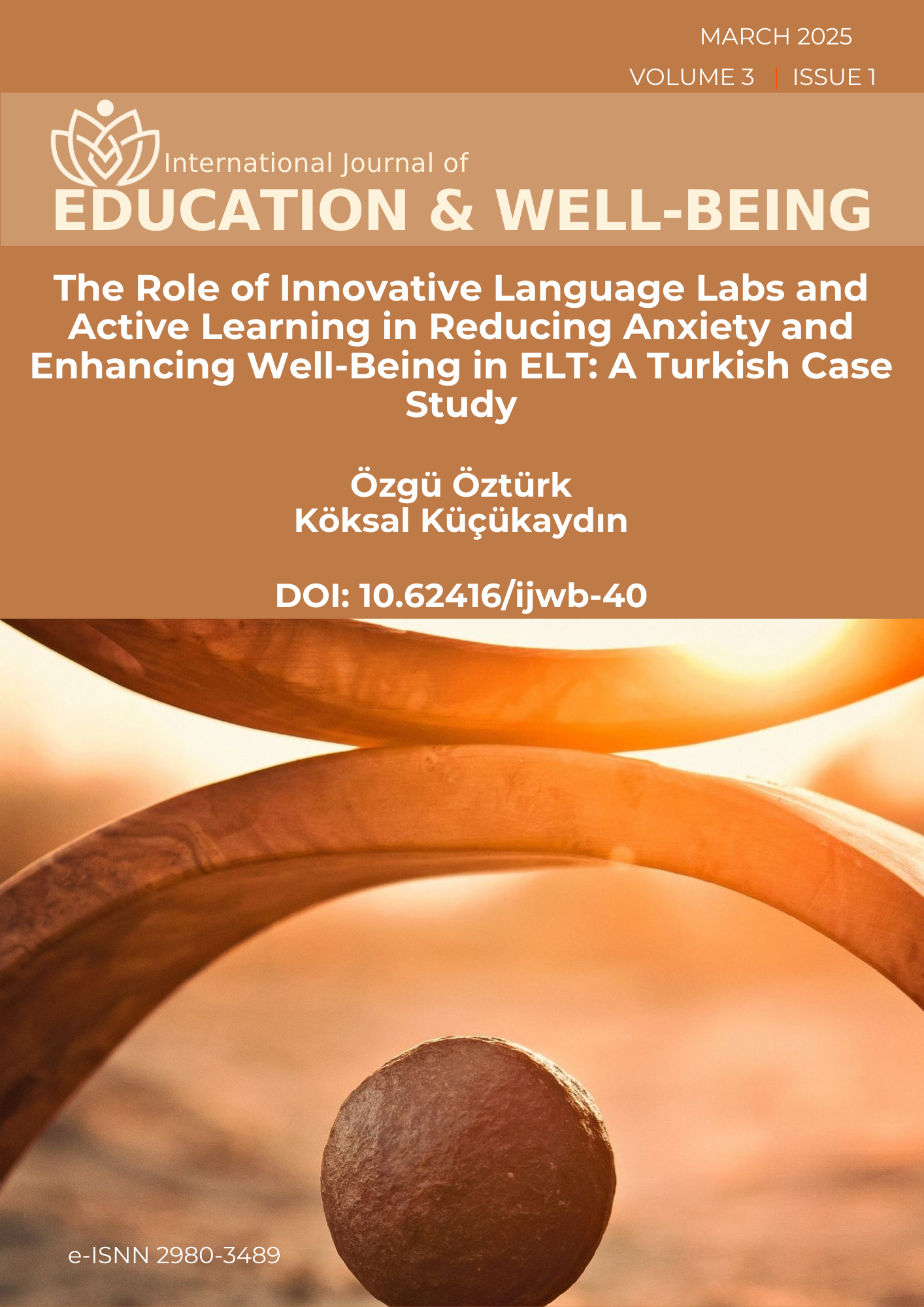The Impact of Innovative Learning Spaces on Students’ Wellbeing: Turkish Example
DOI:
https://doi.org/10.62416/ijwb-40Keywords:
Foreign Language Teaching, Active Learning, Innovative Language Lab, Foreign Language Anxiety, Learner Well-beingAbstract
Foreign language learning involves acquiring the structures, vocabulary, and communicative functions of a new language. Traditional instructional methods often rely on classroom lectures and textbook exercises, contributing to learner anxiety and hindering language development. Innovative learning environments (ILEs), coupled with active learning strategies, offer a promising alternative. Active learning transforms the classroom dynamic, empowering students and potentially reducing performance pressure. Motivated by this potential, this study investigates the impact of active learning within the Innovative Language Laboratory (ILL) at Büyükçekmece Atatürk Anatolian High School in Istanbul. We examine how these methods influence students' emotional states and anxiety levels during English language acquisition. The study involved 144 ninth-grade students who participated in two weekly ILL sessions, incorporating active learning techniques, over a six-week period. Quantitative measures were used to analyse students' subjective experiences. Findings indicate that active learning within the ILL creates a more supportive language learning environment, leading to lower stress, increased self-confidence and wellbeing of students. Key elements contributing to these outcomes include collaborative activities, student-led exploration of technology, and gamification. This study highlights the potential of the ILL model, combined with active learning, to transform the foreign language learning experience. It emphasises the importance of student agency, peer interaction, and personalised learning paths in reducing anxiety and fostering well-being.
References
Al-Otaibi, Q. B. (2023). The importance of using language labs in teaching English as a second language. International Journal of Engineering Research and Applications, 13(1), 1–6. http://www.ijera.com
Bagalay, B. D., Bayan, R. T., Caliboso, J. C., & Batang, B. L. (2021). Anxiety in classroom oral participation among ESL college students. TESOL International Journal, 16(4.4).
Bera, N. (2017). The role of language lab in English language learning. International Research Journal of Interdisciplinary & Multidisciplinary Studies, 3(5), 134–142.
Chou, M. H. (2023). Strategies for interactive listening in modern foreign language learning. Language Awareness, 32(1), 169–191.
Çapan, S. A. (2021). Problems in foreign language education in the Turkish education system: Pre-service teachers' accounts. Eurasian Journal of Applied Linguistics, 7(1), 397–419. https://files.eric.ed.gov/fulltext/EJ1293062.pdf
Dörnyei, Z. (2005). The psychology of second language acquisition. Mahwah, NJ: Lawrence Erlbaum Associates.
Elhawary, D., & Hargreaves, E. (2023). Why won’t they speak English? Guidelines for teachers on using pair work to enhance speaking in the EFL primary classroom. British Council.
Freeman, S., Eddy, S. L., McDonough, M., Smith, M. K., Okoroafor, N., Jordt, H., & Wenderoth, M. P. (2014). Active learning increases student performance in science, engineering, and mathematics. Proceedings of the National Academy of Sciences, 111(23), 8410–8415. https://doi.org/10.1073/pnas.1319030111
Göğüş, A., & Yetke, Ş. (2014). Öğretme yöntemlerinin çeşitlendirilmesi ile öğrenci motivasyonunun artırılması: İngilizce dersi öğretmen liderliği örneği. Uludağ Üniversitesi Eğitim Fakültesi Dergisi, 27(2), 283–306.
Mohammed, A. M. K. A., & Al-hassan, M. M. A. A. (2023). Effectiveness of implementing active learning strategies in enhancing EFL learners' motivation, attitudes, aptitudes, and skills. Global Journal of Arts, Humanities and Social Sciences, 11(6), 79–87.
Wilang, J. D. (2021). Mindsets of high school students in English language learning. TESOL International Journal, 16(2), 86–105.

Downloads
Published
How to Cite
Issue
Section
License
Copyright (c) 2025 ÖZGÜ ÖZTÜRK- Köksal

This work is licensed under a Creative Commons Attribution 4.0 International License.






